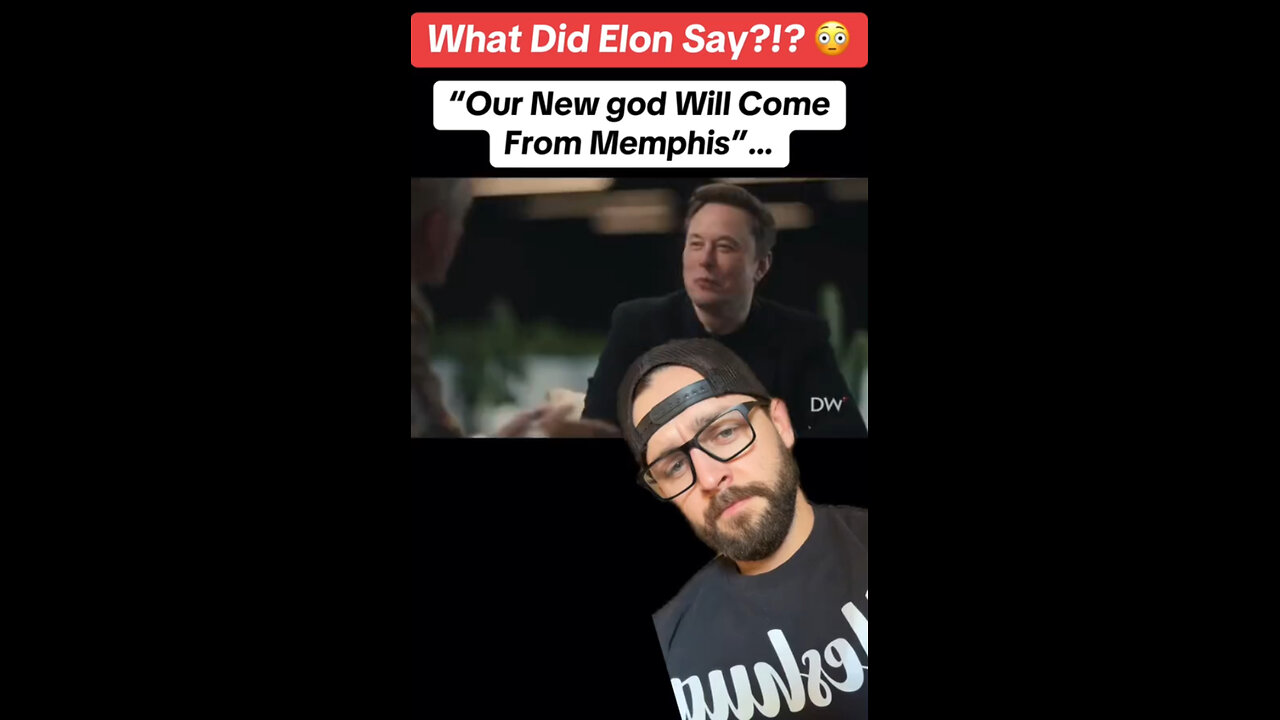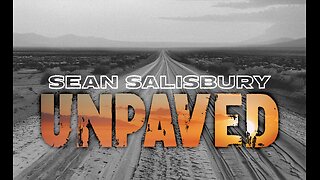Premium Only Content

Memphis and the Rise of AI: Echoes of the Past and a Glimpse of the Future
In an age where technological advancement is accelerating at an unprecedented rate, we often look forward—toward innovation, discovery, and progress. Yet, there are times when looking back, particularly at the symbolic and historical underpinnings of our current path, can provide deeper insights into where we are headed. One such convergence of the past and future is the curious connection between Memphis, both the ancient capital of Egypt and the modern city in Tennessee, and the development of artificial intelligence (AI).
As AI continues to reshape our world, the echoes of ancient history, myth, and symbolism cannot be overlooked. What might seem like a coincidence—the rise of AI projects in Memphis—may instead point to something more profound, a bridge between ancient archetypes and modern technological ambition. By examining the layers of history embedded in Memphis and juxtaposing them against the ambitions of AI, we uncover a rich tapestry of meaning that prompts us to ask: What are the larger implications of this convergence?
The Ancient Power of Memphis: The City of Ptah
To understand the significance of Memphis, we must first look to its ancient roots. Memphis, located near the Nile in Egypt, was not just a political capital—it was the spiritual and cultural heart of the early Egyptian civilization. The city’s primary deity, Ptah, was no ordinary god. Ptah was revered as the god of creation, the ultimate architect of the universe. He was seen as the force that shaped both the physical and metaphysical realms through thought and speech.
This idea of a creator-architect is central to Memphis’ legacy. Ptah was believed to have fashioned the world, not through brute force, but through the power of intention and artistry. His creative prowess extended beyond the material; he was also the patron of craftsmen and artisans, imbuing the skills of creation and design with divine significance. This association with creation, architecture, and the shaping of reality is particularly striking when we consider the modern role of artificial intelligence in Memphis, Tennessee—a city sharing its name with the ancient capital.
In ancient Egypt, Memphis was the center of technological and artistic advancement. Similarly, in today’s Memphis, the work being done in AI research and development reflects humanity’s current efforts to shape a new reality, one governed not by traditional tools, but by data, algorithms, and machine intelligence. This parallel between Ptah as the architect of existence and AI as the architect of a new digital world begs the question: Are we, like the ancients, engaged in the act of creating something far more profound than we realize?
AI: The Modern Architect of Reality
While ancient myths placed Ptah as the architect of the universe, in our modern world, artificial intelligence is increasingly seen as the architect of the future. AI systems are rapidly becoming embedded in nearly every aspect of our lives—from finance to medicine, from transportation to personal assistants. The scope of AI’s potential to reshape the human experience is staggering. But with this power comes questions of control, ethics, and consequences.
The analogy between Ptah and AI is not simply poetic. Just as Ptah shaped the world through thought and intention, AI is built to simulate and amplify human intelligence. It processes information, makes decisions, and can even predict human behavior with increasing accuracy. What’s more, AI is moving beyond simple algorithms—it is evolving toward something that can reshape our very perception of reality, much like the myths surrounding ancient deities.
In this context, AI becomes a creator in its own right, potentially designing systems and structures that outpace human understanding. But just as the ancient Egyptians revered the balance between creation and order, there are challenges to allowing a technology like AI to operate without boundaries or oversight. Like Ptah, who was both a creator and a ruler, AI represents a duality of power—a tool for tremendous creation and, if misused, for significant disruption.
The Symbolism of Memphis: A Bridge Between Worlds
It is no accident that Memphis, Tennessee—a city rich with history and modern ingenuity—has become a hub for cutting-edge AI research. This modern Memphis serves as a bridge between the world of innovation and the world of ancient symbols, where the lines between the technological and the mythical blur. The city, now known for housing some of the most advanced supercomputers and AI projects, evokes the creative spirit of its namesake.
In ancient times, Memphis was a city of unity, much like the biblical Tower of Babel, where humanity sought to bridge the heavens and the earth through collective ambition. Similarly, the development of AI is, in many ways, a new form of human ambition—our attempt to bridge the gap between human consciousness and machine intelligence, to create systems that can think, learn, and evolve in ways that mirror (or even surpass) human capability.
But the parallels don’t end there. In the Bible, Memphis also became a symbol of the consequences of hubris—of a civilization that lost its way when it turned from higher wisdom and sought to build solely through its own designs. In the story of the Tower of Babel, the ultimate message was clear: There are limits to what humanity can achieve on its own, without balance, humility, and understanding.
Today, as AI becomes more advanced, we must ask ourselves: Are we, too, reaching for heights that come with unforeseen risks? Are we, like the people of Babel, constructing a tower that could collapse under its own ambition? The ethical challenges posed by AI, from privacy concerns to decision-making autonomy, suggest that this might not be far from the truth.
The Future of Creation: AI, Ethics, and the Balance of Power
The rise of AI represents more than just technological progress; it represents a philosophical shift in how we understand creation, intelligence, and the boundaries of human capability. AI is not just a tool—it’s a mirror, reflecting both our aspirations and our fears. On one hand, it holds the promise of a future where technology can solve some of humanity’s most pressing problems. On the other, it raises serious questions about control, agency, and ethical responsibility.
Just as ancient Memphis had to navigate the balance between human creativity and divine order, our modern world must navigate the balance between technological advancement and ethical stewardship. AI, as a creation of human minds, requires us to confront the limits of control and the potential consequences of creating systems that could eventually surpass our understanding.
At its core, the rise of AI challenges us to rethink our role as creators. Are we shaping a tool that will serve humanity, or are we building something that will reshape humanity itself? As we push the boundaries of what AI can do, we must remain mindful of the need for wisdom, foresight, and an understanding of the profound impact this technology could have on every aspect of our lives.
Conclusion: Memphis, AI, and the New Age of Creation
The city of Memphis, both ancient and modern, serves as a symbolic touchstone in our journey toward technological advancement. From the creation myths of Ptah to the rise of AI, there is a deep resonance between the ancient world’s understanding of creation and our modern attempts to shape the future through technology. But with great power comes great responsibility, and as we stand at the dawn of a new era of AI, we must ask ourselves: What kind of future are we creating?
As AI continues to evolve, it will be up to us to decide whether we are the architects of our destiny, guided by wisdom and ethical clarity, or whether we risk losing control of the very forces we’ve set into motion. Just as the ancients understood that creation requires balance, we too must understand that our greatest technological achievements must be paired with a deep sense of responsibility and awareness.
In this new age of creation, the legacy of Memphis reminds us that the line between myth and reality is often thinner than we think, and the choices we make today will shape the world for generations to come.
-
 1:34
1:34
FragmentsOfTruth
2 days agoLockstep: The Rockefeller Foundation’s 2010 Blueprint for Global Control?
1731 -
 LIVE
LIVE
Redacted News
36 minutes agoBREAKING! UKRAINE AGREES TO CEASEFIRE WITH RUSSIA... BUT THERE'S A BIG CATCH | Redacted News
10,148 watching -
 LIVE
LIVE
Candace Show Podcast
1 hour agoShould We Feel Bad For Blake Lively? | Candace Ep 157
4,088 watching -
 1:17:27
1:17:27
Awaken With JP
4 hours agoThe Current Thing: Tesla Protesting - LIES Ep 82
22.8K13 -

Sean Unpaved
1 hour agoNFL Free Agency Rolls On! MLB Spring Training Heats Up along with 3x World Series Champ Dave Stewart
876 -
 2:10:15
2:10:15
Right Side Broadcasting Network
6 hours agoLIVE REPLAY: White House Press Secretary Karoline Leavitt Holds Press Briefing - 3/11/25
78.6K29 -
 2:06:00
2:06:00
The Quartering
4 hours agoTrump Goes NUCLEAR On Canada, Blasts Massie, Harry Potter Race Swap, Man Humiliated On TV Show
44.2K27 -
 1:03:09
1:03:09
The White House
4 hours agoPress Secretary Karoline Leavitt Briefs Members of the Media, Mar. 11, 2025
43.6K23 -
 1:07:03
1:07:03
Winston Marshall
3 hours agoEXCLUSIVE : Oliver Anthony On Life After ‘Rich Men’, The Christian Counter Culture and The Elites
22.3K5 -
 1:44:47
1:44:47
Russell Brand
5 hours agoDigital Censorship & Political Warfare: X Attacked, Rand Paul Rebels, Free Speech on Trial – SF551
106K19